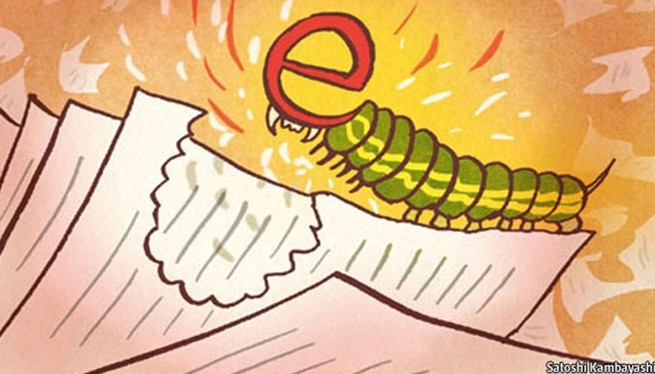
『电子图书的出现使读者有了更多选择,而图书出版商若想立于不败之地,就必须积极应对电子时代的到来。』
Disappearing ink
正在消失的铅字
Sep 10th 2011 | from The Economist

DURING the next few weeks publishers will release a crush of books, pile them onto delivery lorries and fight to get them on the display tables at the front of bookshops in the run-up to Christmas. It is an impressive display of competitive commercial activity. It is also increasingly pointless.
More quickly than almost anyone predicted, e-books are emerging as a serious alternative to the paper kind. Amazon, comfortably the biggest e-book retailer, has lowered the price of its Kindle e-readers to the point where people do not fear to take them to the beach. In America, the most advanced market, about one-fifth of the largest publishers’ sales are of e-books. Newly released blockbusters may sell as many digital copies as paper ones. The proportion is growing quickly, not least because many bookshops are closing.
For readers, this is splendid. Just as Amazon collapsed distance by bringing a huge range of books to out-of-the-way places, it is now collapsing time, by enabling readers to download books instantly. Moreover, anybody can now publish a book, through Amazon and a number of other services. Huge choice and low prices are helping books hold their own on digital devices, even against “Angry Birds”.
For publishers, though, it is a dangerous time. Book publishing resembles the newspaper business in the late 1990s, or music in the early 2000s. Although revenues are fairly stable, and the traditional route is still the only way to launch a blockbuster, the climate is changing. Some of the publishers’ functions—packaging books and promoting them to shops—are becoming obsolete. Algorithms and online recommendations threaten to replace them as arbiters of quality. The tide of self-published books threatens to swamp their products. As bookshops close, they lose a crucial showcase. And they face, as the record companies did, a near-monopoly controlling digital distribution: Amazon’s grip over the e-book market is much like Apple’s control of music downloads.
Yet there are still two important jobs for publishers. They act as the venture capitalists of the words business, advancing money to authors of worthwhile books that might not be written otherwise. And they are editors, picking good books and improving them. So it would be good, not just for their shareholders but also for intellectual life, if they survived.
They are doing some things right. Having watched the record companies’ impotence after Apple wrested control of music-pricing from them, the publishers have managed to retain their ability to set prices. But they are missing some tricks. The music and film industries have started to bundle electronic with physical versions of their products—by, for instance, providing those who buy a DVD of a movie with a code to download it from the internet. Publishers, similarly, should bundle e-books with paper books.
They also need to become more efficient. Digital books can be distributed globally, but publishers persist in dividing the world into territories with separate editorial staffs. In the digital age it is daft to take months or even years to get a book to market. And if they are to distinguish their wares from self-published dross, they must get better at choosing books, honing ideas and polishing copy. If publishers are to hold readers’ attention they must tell a better story—and edit out all the spelling mistakes as well.(550 words)
特别声明:①凡本网注明稿件来源为"原创"的,转载必须注明"稿件来源:育路网",违者将依法追究责任;
②部分稿件来源于网络,如有侵权,请联系我们沟通解决。
25人觉得有用
24
2011.10
『电子图书的出现使读者有了更多选择,而图书出版商若想立于不败之地,就必须积极应对电子时代的到来。......
24
2011.10
『昔日的繁荣小城如今被“失业率”打垮,在美国城市曼西,产业工人就业艰难。』 Off-tra......
24
2011.10
『如今,环境恶化如此严重,即使每个人尽其所能为绿色生活做贡献,也是无济于事。』 Going Green b......
24
2011.10
『继唱片业以及报纸产业之后,纸质出版物也将迎来电子化时代,这一趋势是否真的势不可挡?其中又有何利......
24
2011.10
『要找到新的研究课题,一些语言学家只要开阔研究领域,从记录濒临消失的语言开始。』 Say what? ......
24
2011.10
『美国学生的SAT读写成绩不断下滑,这表明目前教育改革只立足于测评和提高教师素质是远远不够的。』
......